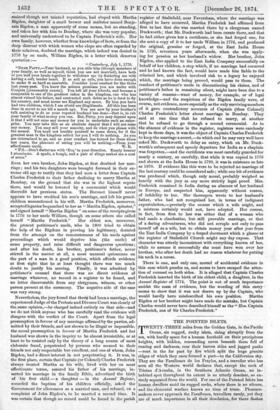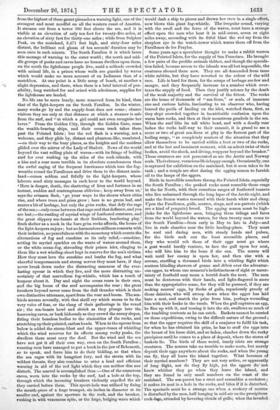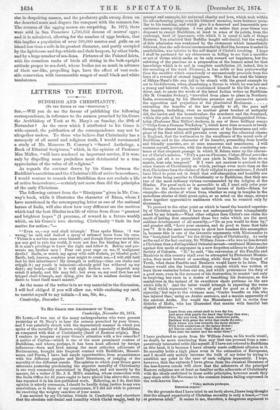THE POINTED ISLETS.
TWENTY-THREE miles from the Golden Gate, in the Pacific Ocean, six rugged, rocky islets, rising abruptly from the sea, with hardly space for a human foothold on their precipitous heights, with hidden, resounding caves beneath them full of roaring and darkness, rear their barren sides and jagged peaks —rent in the far past by fire which split the huge granite ridges of which they once formed a part—to the Californian sky. They are the Farallones de los Frayles, and a traveller who has seen all the Western world declares that, except the rock of Tristan d'Acunha, in the Southern Atlantic Ocean, no in- habited spot throughout its extent is so utterly desolate, so en- tirely separated from the world. For one of the Pointed Islets has human dwellers amid its rugged rocks, where there is no silence, and the elemental warfare knows no time of truce. Pleasure- seekers never approach the Farallones, travellers rarely, yet they are of much importance in all their desolation, for there flashes from the highest of these gaunt pinnacles a warning light, one of the strongest and most needful on all the western coast of America. It streams out from a tower 360 feet above the sea, and it is visible at an elevation of only ten feet for twenty-five miles, at an elevation of sixty feet for thirty-one miles ; while from Sulphur Peak, on the mainland, 3,471 feet high, and sixty-four miles -distant, the brilliant red gleam of .ten seconds' duration may be -seen once in each minute. The South Farallon it is which bears this message of warning to the outer world ; the north and mid- dle groups of peaks and caves have no human dwellers upon them, on the south the lighthouse people live, amid a solitude crowded with animal life, in a prison whose walls are guarded by waves which would make no more account of an Indiaman than of a matchbox. At one point is a little scrap of beach, at another a slight depression, and there, when there is a brief interval of pos- sibility, long watched for and seized with adroitness, supplies for the lighthouse are landed.
No life can be more lonely, more removed from its kind, than that of the light-keepers on the South Farallon. In the winter, many weeks go by and the supply-boat does not come ; chance visitors they see only at that distance at which a steamer is safe from the surf, and "at which a girl could not even recognise her lover." From the Golden City, through the Golden Gate, come the wealth-bearing ships, and their ocean track takes them past the Pointed Islets ; but the red flash is a warning, not a welcome, and they glide by, distant and phantom-like, unsaluted, —on their way to the busy places, as the knights and the maidens glided over the mirror of the Lady of Shalott. News of the world beyond the vast rolling plain of waves—with its fringe of boiling -surf for ever rushing up the sides of the rock-islands, with a hiss and a roar more terrible in its absolute ceaselessness than the awful raging of the frequent hurricanes which toss the fog- wreaths round the Farallones and drive them to the distant main- land—comes seldom and fitfully to the light-keepers, whose labours send sixty messages in each hour to the world beyond. Here is danger, death, the shattering of lives and fortunes in an instant, sudden and contemptuous oblivion ; keep away from us,' says the crimson flash, go. your ways to the shores where cities rise, and where trees and grass grow ; here is no green leaf, and scarce a bit of herbage, but only the grim rocks, that defy the rage of the sea;—only come between that rage and that defiance, and you are lost;—the rustling of myriad wings of feathered creatures, and the great slippery sea-beasts at their limbless, lumbering play.' Such shelter as a nook in the bare grim rocks affords, the house of the light-keepers enjoys; but no harmonious stillness consorts with their isolation, no peacefulness with the monotony which counts the .alternations of fog and sunshine as its only relief,—sunshine, setting its myriad sparkles on the waste of waters around them, or the white ocean-fog, shrouding their prison islet, clinging to them like a wet winding-sheet kept in reserve for the sea's victims. How they must love the sunshine and loathe the fog, and what -cheerful temperaments and strong nerves they must have, if they -never break down under the distracting sameness of the ever- lasting uproar in which they live, and the more distracting un- -certainty of that marvellous fog-whistle, which has a touch of humour about it. Day and night the ocean roars in their ears, and the big boom of the surf accompanies the roar ; the great breakers beyond never cease from the dull thunder which is their own distinctive utterance, apart from the roar and boom. The sea- birds scream severally, with that shrill cry which seems to be the very voice of fear, or the clang of their gatherings in the vexed air ; the sea-beasts howl and shriek as they plunge into the burrowing caves, or bark hideously as they crowd the sunny slopes, -fitting their boneless bodies to the sinuosities of the rocks, and stretching up their pointed, earless heads. When to the uproar from below is added the storm-blast and the upper-tones of whistling
which the wind reserves for its effects among rocky peaks, the dwellers there must envy the deaf. But the wind and the sea have not got it all their own way, even on the South Farallon ; cunning men have managed to put a hook in the jaw of Behemoth, so to speak, and force him to do their bidding, so that when the sea rages with its hungriest fury, and the storm with its -wildest threats, they also combine to utter a loud and efficient warning in aid of the red light which they can neither dim nor -disturb. The marvel is accomplished thus :—One of the nnmerous -caves, worn into the rocks by the surf, had a hole at the top, through which the incoming breakers violently expelled the air they carried before them. This spout-hole was utilised by fixing the month-piece of a huge trumpet, six inches in diameter at its smaller end, against the aperture in the rock, and the breaker, rushing in with venemous spite, or the huge, bulging wave which would dash a ship to pieces and drown her crew in a single effort, now blows this giant fog-whistle. The irregular sound, varying with the swell and the force of the waves, must have a strange effect upon the men who hear it in mid-ocean, seven or eight miles away, seconding with its fitful blast the red ray from the sleepless eye in the watch-tower which warns them off from the Farallonea de los Frayles.
Some,years ago a speculator thought to make a rabbit warren of the Pointed Islets, for the supply of San Francisco. He brought a few pairs of the prolific animals thither, and though the specula- tion failed, because access to the islands was all but impossible, the creatures abound there now. They are all descended from tame white rabbits, but they have reverted to the colour of the wild race. Life is hard for them, for the scraps of herbage are few and meagre, and they frequently increase to a number which over- taxes the supply of food. Then they justify science by the death of the weak majority and the survival of the fittest. The rocks are the home of thousands of " sea-lions," or seals, of immense size and curious habits, fascinating to an observer who, having braved the perils of lauding on the islet, watched them, first, as they slept crowded together in inextricable confusion upon the warm bare rocks, and then at their monstrous gambols in the sea. When the surf lifts its tall white head, and with a deadly roar lashes the rocks half-way to their summit, it is grand to see a score or two of great sea-lions at play in the fiercest part of the boiling surge, " so completely masters of the situation that they allow themselves to be carried within a foot or two of the rocks, and at the last and imminent moment, with an adroit twist of their bodies, avoid the shock, and diving, reappear beyond the breaker." These creatures are not persecuted as are the Arctic and Norway seals. Their clumsy, voracious life is happy enough. Occasionally, one is captured for exhibition on the mainland, but it soon takes to its tank ; and a couple are shot during the egging season to furnish oil to the lamps of the eggers.
Birds in incredible numbers throng the Pointed Islets, especially the South Farallon ; the peaked rocks must resemble those crags in the far North, with their countless ranges of feathered tenants who live unharmed through the long lapse of the Arctic night, and make the frozen wastes resound with their harsh whirr and clang. Upon the Farallones, gulls, murres, shags, and sea-parrots (which are a kind of penguin) breed. The egging season must- be high- jinks for the lighthouse men, bringing them tidings and faces from the world beyond the waters, for then twenty men come to the South Farallon—from early in May to late in July—and live in rude shanties near the little landing-place. They must be cool and daring men, with steady heads and pulses, for the birds seek out the least accessible places, and they who would rob them of their eggs must go where a goat would hardly venture, to face the gull upon her nest, who will bite him to the bone if she can. The murre will wait until her enemy is upon her, and then rise with a scream, startling a thousand birds into a whirling flight which scatters blinding showers of guano and debris over the adventur- ous egger, to whom one moment's indistinctness of sight or uncer- tainty of foothold may mean a horrid death the next. The men must be dexterous with their hands, and light-fingered in more than the appropriative sense, for they will be pursued, if they are seeking murres' eggs, by flocks of gulls, rapaciously greedy of those dainties, who will swoop down when the egger has laid bare a nest, and snatch the prize from him, perhaps wounding him with their beaks in the tussle. When the gull captures an egg, he flies up with it, and tossing it into the air, swallows so much of the tumbling contents as he can catch. Baskets cannot be carried
on these expeditions, owing to the difficult nature of the ground ; so that the egger requires the skill of a conjuror to fulfil his task, for when he has obtained his prize, he has to stuff the eggs into the breast of his loose shirt, and so laden, clamber down the rocky precipices until he comes to a place of deposit, where the stores of baskets lie. The birds of these weird, lonely islets are strange creatures. The murres take no trouble to make nests, but merely deposit their eggs anywhere about the rocks, and when the young can fly, they all leave the island together. What becomes of their myriad numbers? They are not very active, or apparently of long flight, nor do they fly high, yet the eggers do not know whither they go when they leave the island, and they are found in only small numbers on the coast of the mainland. The sea-parrot has a crest and resembles a cockatoo ; it makes its nest in a hole in the rocks, and bites if it is disturbed. The spectacle must be a strange one when a rookery of murres is disturbed by the men, half hanging in mid-air on the precipitous rock-fage, attended by hovering clouds of gulls; when the invaded
rise in despairing masses, and the predatory gulls swoop down on ' precept and example, his universal charity and love, which took within the deserted nests and dispute the conquest with the common foe. its all-embracing grasp even his bitterest enemies, were features pecu- liar to his teaching, and which give it a deserved and honourable pre- The returns of the egging season are surprising. In 1872, there eminence among religions. I was glad to notice that your Grace was were sold in San Francisco 1,700,052 dozens of murrea' eggs ; disposed to except Buddhism, at least in some of its points, from the
li
and it is calculated, allowing for the number of eggs broken, that Eastern. You admitted that Buddha taught self-denial, but the weight this implies a population of over 100,000 mattes and gulls on an of this admission was weakened by the statement which immediately- island less than a mile in its greatest diameter, and partly occupied followed, that the self-denial recommended byBudiha, because it ended in by the lighthouse and fog-whistle and their keepers, by other birds, annihilation, was inferior to the self-denial of Christ's teaching. I hope- and by a large number of sea-lions. Pictures of the Pointed Islets, I shall be pardoned for my obtuseness in failing to see that a sacrifice or act of virtue which seeks as its only reward not happiness, but the with the countless ranks of birds all sitting in-the bolt-upright subduing of the passions as a preparation of the human mind for that attitude proper to sea-fowl, whose bodies are so much in advance knowledge which is to end in complete annihilation (if, indeed, this is- of their_ oar-like, propelling legs, have the effect of vast rock- the meaning of the word _Nirvana), is less noble or less praiseworthy than the sacrifice which consciously or unconsciously proceeds from the Side cemeteries, with innumerable ranges of small black and white hope of a reward of eternal happiness. Who that has read the history




































 Previous page
Previous page